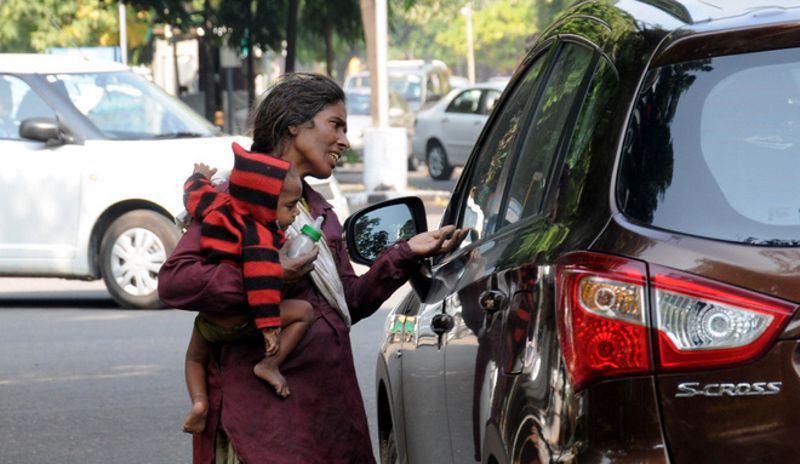
BEGGARS are common to virtually all Indian cities and towns. They are an irritant for most of us, mainly because they highlight an ugly truth. - File photo
Rahul Singh
BEGGARS are common to virtually all Indian cities and towns. They are an irritant for most of us, mainly because they highlight an ugly truth. Despite our development and progress, we are still a very poor country. In fact, we have, by far, the largest number of people living below the poverty line.
Beggars target foreigners at tourist spots, pestering them continuously. Indians are hardened to beggars. Foreigners, who generally have few beggars in their own countries, aren’t. They cringe when a deformed person, or a child, stretches out his or her hand for a few coins. The more sensitive find the experience so disturbing that they don’t want to come again to India. These beggars who make a beeline for foreigners are an embarrassment, certainly for me.
We probably have more beggars than any other country in the world, an equally shameful statistic. The issue of mendicancy has been debated many times. Attempts have been made to banish it. During Indira Gandhi’s Emergency rule, her son, Sanjay Gandhi, ordered the demolition of the slums in the Muslim-dominated Turkman Gate area of Old Delhi. Several people who protested were killed in police firing, and those who lost houses were relocated far away across the Yamuna river. They were mostly impoverished, and many must have been beggars. Like his other ham-handed, though well-intentioned, initiatives, the move backfired badly, and contributed to Indira Gandhi’s defeat.
The Supreme Court has been quite categorical on the subject. It recently refused to ban begging and observed that “it is a socio-economic problem, and people are forced to beg to eke out their livelihood due to the absence of education and employment”. This is in line with similar other judgments. In 2018, the Delhi High Court struck down a law that made begging in the Capital a crime, saying that criminalising begging “violates the fundamental rights of the most vulnerable people”.
With an eye on the foreign tourists who visit the city and the diplomats who live there, the Delhi government has made a novel move to make the National Capital Region beggar-free. It has embarked on a three-month “rehabilitation programme”. Batches of beggars are to be trained in skills that can provide them a livelihood, such as painting walls. During the training, they will get a daily stipend of Rs100.
It’s a laudable idea, but at best it will only make a marginal difference. Begging is too deep-rooted in Indian society, and the main causes must first be addressed. Most religions unfortunately sanction it. Giving alms to beggars is considered a noble act, which is why one sees so many beggars at places of worship. Buddhist monks and nuns traditionally live by seeking alms, since Gautama Buddha himself did this at one stage of his life. Theoretically, Islam forbids begging, and has laid down ways to prevent it, such as “zakat”, which is basically the levying of a tax to benefit the poor. “Give gifts, as it will grow love between you,” declared the Prophet. Charity is ingrained in Islam, as it is in Christianity. However, the reality is entirely different: Pakistan and Bangladesh have plenty of beggars.
Sikhs take great — and justifiable — pride in pointing out that there are very few beggars in their community. Once, many years ago, when I went out with my grandmother, she saw a Sikh beggar. After scolding him, she took him home and fed him, all the while admonishing him, pointing out that he was a disgrace to Sikhism and must make an honest living. I am sure the chastened man did not return to begging.
Though poverty, or disability, drives many to mendicancy, it is also a well-organised racket in many cities. These organised beggars regard begging as their livelihood, as they earn much more than they would in regular jobs. Sometimes, children are deliberately maimed to make them more sympathetic to the public. The babies you see in their mother’s arms are often drugged. Look at it this way: how would a shoe-shine boy, trying to earn an honest living, feel if he sees another boy at a traffic light begging and getting much more? So, don’t give alms, no matter how sorry you may feel. Give some food instead, or keep some biscuits for those who tap at your car window.
Ultimately, however, the answer lies in removing poverty, as China has done so dramatically. Education, and the jobs that it brings, has empowered the Chinese. There is another equally important factor: healthcare and sanitation.
The western world once had plenty of beggars, and Christianity as well as Judaism sanctioned it. Beggars formed a large class in the Gospel age. But economic progress and better livelihoods steadily removed poverty. The Protestant ethic, stressing work, also helped. You still see beggars in USA and in Europe, but most of them are homeless people, often illiterate migrants unable to find a job.
The Supreme Court is right in saying begging cannot be banned. But poverty, the root cause and the biggest challenge that faces us, can certainly be lessened by better education and healthcare.
— The writer is a veteran journalist
Join Whatsapp Channel of The Tribune for latest updates.




























